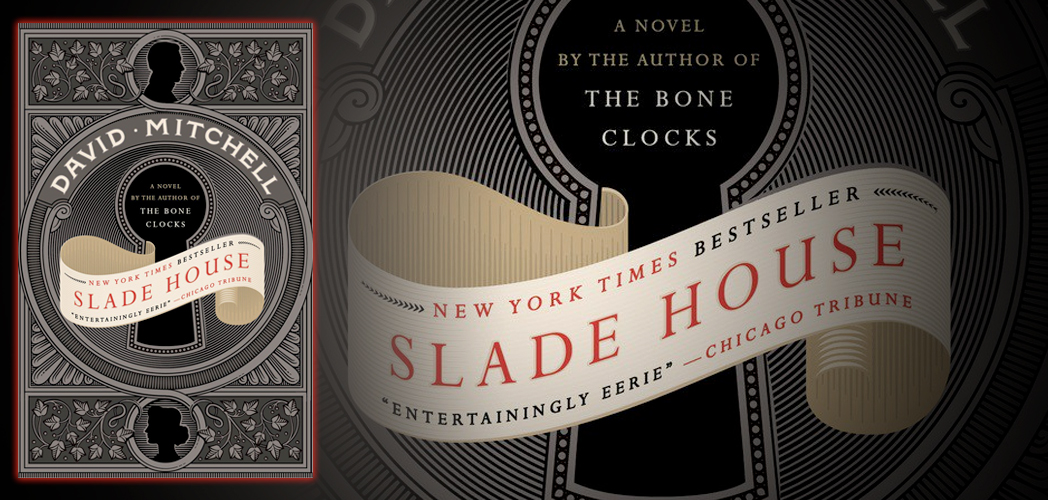
Review: Slade House by David Mitchell
Written by: Tony Lazlo, CC2K Staff Writer
Imagine Marvel’s Doctor Strange, with all of its trippy imagery, cool psychic battles, and supernatural-bordering-on-super-science worldbuilding. Now imagine that story written by a master novelist with protean-powerful command of first person, and you’d have David Mitchell’s Slade House.
Needless to say, SPOILERS LIE AHEAD!
My friend Karl Mueller enthusiastically recommended this book, and I’m glad he did. Seldom had a book come to me so highly recommended—Karl basically hounded me until I put it in my queue—or so shrouded in secrecy. Karl wouldn’t tell me a thing about it; neither would my fianceé after she read it. So it had to be done.
What a treat. I scanned a few reviews before diving into my own, and the one criticism levied most often against Slade House (and Mitchell’s writing in general) is that he’s more of a short-story writer than a novelist. Indeed, Slade House unfolds over a series of interconnected vignettes, but for this crusty old novelist, it felt like a novel. Its heroes are an unlikely family—a family of victims, each of whom falls prey to the novel’s twin villains, a pair of “atemporals” who’ve mastered a dark art that grants them immortality so long as they eat a particular flavor of soul every nine years. Over the course of five sections, each set in a different decade (and in a different victim’s mind), Mitchell depicts these soul-snarings with an impressive mastery of first-person narration. It’s not enough that he so ably captures the speech-patterns of his disparate cast, but he also captures their thought-processes with impressive dexterity and fidelity. (His portrayal of the inner-life of an autistic child is especially well done.)
But if you’re reading this and wondering why I compared this Englishman’s novel to a big Marvel blowout, here’s why: the final section recounts the final fall of the twin atemporals, as they try—and spectacularly fail—to ensnare a rival immortal known as a horologist, who bests them in a rousingly stupendous bout of psychic combat. I mean, get a load of this deliciously inventive sci-fi vocabulary:
Jonah is glyphing up a pyroblast with his bare hands. I telegram Don’t! but Jonah’s head is roaring and he can’t hear so I shout it out loud—“ Don’t!”— as the vestiges of the hospital room fall away, revealing the long attic of Slade House. Eighty years of metalife end at this forking path: Do I join Jonah’s assault against an untested enemy who has goaded us to attack her? Even if our victory would end in voltaic starvation? Or do I forsake Jonah, watch him fry, but keep alive a fetal hope of survival? Even as Jonah rashly, rashly, applies every last volt in his soul to Marinus’s incineration, I don’t know what to do. (…) Marinus, fast as thought, glyphed a concave mirrorfield[.]
But if invention is among Slade House’s chief virtues, so is a curious sense of family. After their souls are consumed, each of the twins’ victims remains trapped in Slade House as a husk, a simulacrum, a revenant-echo of their former selves. As the decades roll by—and the twins’ victims pile up—this strange lineage of suffering conspires to share information from one soul-sucking to the next. (One victim passes on a weapon to the next, whose soulless body-husk manages to wound one of the twins before they can consume the next soul.) That sense of unified trauma gives Slade House both a heartbeat and a throughline.
It all makes for an impressively mounted novel that’s one part music box, one part Russian doll. (I’m told his other novels are not only similar in structure, but that they also occupy a common universe. Who do I have to pay to get an Mitchell Cinematic Universe into multiplexes?)
Highly recommended.
Odds and ends I liked:
• My favorite moment as a reader came in the Freya chapter. About two pages in, I thought, “Oh, boy. I bet she’s already trapped in their orison.”
• Loads and loads of Twilight Zone-caliber chills. Incidentally, Hollywood could spend a year making nothing but movies where people try to escape a room only to find they keep entering the same room, and I wouldn’t complain.
• One detail that’s lingered with me: I really like how the shitheel cop in part two was one of the “enbrightened,” or whatever. Later, when they revealed how the twins chose their victims, I chuckled and thought, “Wait, that a-hole was enbrightened?” But his clairvoyance probably manifested in a keen sense of intuition, making him a good cop. Nice touch.

